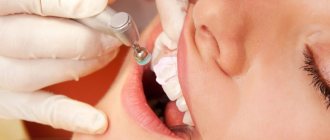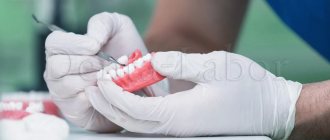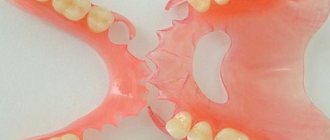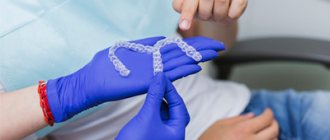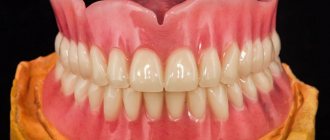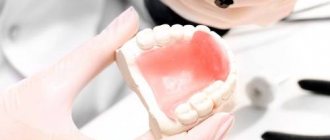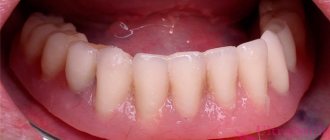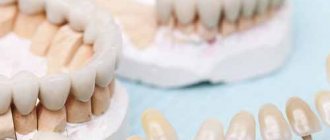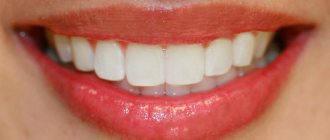Regular care of removable dentures is a necessary measure to maintain a clean oral cavity. After eating, bacterial plaque forms on teeth and orthopedic structures, which causes bad breath and can provoke gum inflammation. To avoid unnecessary problems, you should take care of your dentures daily. Maintaining hygiene will extend their life, prevent the development of dental diseases and help maintain an attractive smile.
Hygienic products for denture care
Caring for orthopedic structures does not take much time. Dentures can be removed, cleaned of dental plaque and rinsed under water after eating. For cleaning, many products are used that help get rid of pigmented plaque and remove harmful microflora.
Toothbrush
For everyday hygiene, use a personal brush with soft bristles. Too hard villi can scratch the surface of the prosthesis, and bacteria will accumulate in microscopic cracks. Cleaning should be done twice a day. Instead of a regular brush, you can use a special double-sided brush, which is designed for caring for orthopedic structures. On one side there is a long working surface, which is designed to clean the outer surface of the product. On the inside there is a short part with rounded bristles that clean the inner surface of the prosthesis well.
Toothpaste
To clean orthopedic devices, it is recommended to use low-abrasive toothpaste. As with the brush, if you use products with a high abrasive content, this can lead to damage to the surface of the structure. Children's toothpastes are considered the most gentle. They gently clean teeth and provide gentle care for dentures. You can also use a therapeutic and prophylactic paste, which contains plant components with an antibacterial effect.
Tooth brush
Standard denture care products can be supplemented with a dental brush, which helps remove dirt from the interdental spaces. Unlike a toothbrush, it has finer bristles that can penetrate even hard-to-reach places. Brushes vary in shape, size, and density of bristles. The vector and principle of their movement during cleansing is similar to a toothpick, however, they are reusable and require washing after the procedure.
Rinse aid
Rinses include special liquids that disinfect the oral cavity and prevent the development of inflammation. They can be used after every meal or sugary drink. During the care process, they clean dentures from food debris, prevent the formation of tartar and freshen breath. Consumers are offered a wide selection of rinses for various purposes:
- anti-caries;
- anti-inflammatory;
- whitening;
- for sensitive gums and teeth;
- combined.
When wearing removable dentures, it is advisable to select products that contain antimicrobial components and prevent the proliferation of pathogenic microorganisms.
Floss
Floss, or dental floss, is used to clean the interdental spaces and the area near the gums. It is made from polymer or natural fibers and comes in small rolls. To clean, you need to cut a small piece of thread, insert it into the gap between the crowns and move it up and down. Regular use of floss helps eliminate plaque, eliminates unpleasant odor, and prevents the creation of a favorable environment for the proliferation of microorganisms.
Irrigator
An irrigator is a device for oral hygiene that performs cleaning by supplying a jet of water under pressure. It can be used to clean both natural teeth and removable orthopedic structures. Most irrigators have two operating modes (“jet” or “shower”), which are selected according to the desired effect. Thus, the “shower” provides general cleaning of the oral cavity and at the same time performs hydromassage of the gums, and the “jet” is used to remove plaque from the interdental space, in the cervical area and other hard-to-reach places.
Citric acid and soda, tablets for cleaning and disinfection
All of the above products are suitable for periodic oral hygiene and removable dentures. They are used as aqueous solutions in which structures are placed for some time. They can also be used as a mouth rinse. Thanks to their antibacterial effect, they effectively remove bacteria and help prevent inflammatory processes. The solution is prepared depending on the chosen product. So, when using citric acid, take one teaspoon of powder and mix with 150 ml of boiled water. The average time for soaking dentures in this solution is 10 minutes.
Features of nutrition when wearing prostheses
Features of nutrition with dentures depend on a number of factors, primarily on the type of denture. If the prosthesis is made of high-quality materials and does not cause discomfort to the patient, then a full meal is allowed on the day of installation of the structure.
Any dietary restrictions when installing dentures are imposed only if the patient initially has inflamed gums. For example, if a person had to have teeth removed to install a denture. In such cases, inflammation persists for some time. When chewing, pressure is applied to the gums, which leads to pain. Therefore, in case of inflammatory processes in the gums, it is recommended to limit the chewing load. This will help the gum tissue recover faster.
During the first weeks after installation of the prosthesis, doctors recommend following these simple rules:
- Try to eat soft foods . For example, purees, soups, thermally processed vegetables. If you want meat, then give preference to minced meat products (for example, cutlets, meatballs).
- Avoid extreme temperatures . Eat warm or room temperature foods. Foods and drinks that are too cold or hot should be avoided.
- Chew your food carefully . Don't rush while eating. Chew your food thoroughly, this will make it easier to get used to the design. Avoid eating large pieces. Cut them into small pieces.
- Avoid painful sensations . After installing the denture, chewing may feel painful for some time. Therefore, you should chew on the side of the mouth where there is no pain.
- Taboo on biting with the front teeth . Develop the habit of not biting food with your front teeth.
The patient is allowed to return to their usual diet after adaptation, when the prosthesis does not cause discomfort or pain. At the same time, it is advisable to turn some recommendations into habits. For example, this means avoiding too solid foods, as well as extremely hot or cold foods and drinks. If you really want ice cream, then let it sit for a while at room temperature.
How to properly clean dentures
Removable dentures require regular cleaning. All rules for their hygiene can be divided into two categories - daily and periodic.
Daily
Daily care includes brushing your teeth in the morning and evening with a soft toothbrush. When cleaning, special attention is paid to the inside of the structure, which is in constant contact with the gums. After eating, the structure should be removed and rinsed under water. Additionally, you can use an irrigator, which thoroughly cleans surfaces and allows you to remove bacterial plaque in hard-to-reach places. When cleaning, care should be taken not to damage the locks, hooks and other elements of the orthopedic structure.
Periodically
Proper care of dentures does not just mean cleaning them from deposits with a brush and irrigator, but also using bactericidal solutions aimed at destroying pathogens. They are used up to three times a week according to the manufacturer's instructions. Additionally, it is recommended to use agents that inhibit bacterial activity. This is especially true several years after the installation of structures, since by this time more deposits have accumulated on them. These products include sprays and lozenges, which not only help fight pathogenic microflora, but also freshen breath and prevent inflammatory processes.
Getting used to the artificial jaw
It will take at least one to two months to get used to the prosthesis. This process is often quite difficult and painful. At the same time, many go through chafing of the structures, and also traditionally experience difficulties chewing and speaking.
There is no way to do this without willpower and perseverance. No matter how difficult it may be, doctors recommend not removing the prosthesis for the first two weeks, even at night. In this case, the patient is advised to “speak it out” by talking and reading aloud, especially in front of a mirror.
In the first month after the installation of the plates, most people turn to their orthodontist regarding the comfort of wearing a denture, and rightly so. The installation of dentures is followed by a painstaking and difficult fitting process. After all, any notch on the devices can provoke the development of many health problems for the patient, and make the process of getting used to it extremely painful.
Wearing dental structures is facilitated by the use of fixing agents (gel, cream, glue, paste, balm, fixing strip). At the same time, the plates fit perfectly and have no gaps between the gums for food crumbs to get in.
Disinfection of the prosthesis
From time to time, dentures should be disinfected, which will clean the surface of harmful bacteria. You can do this in two ways:
- Using disinfectants - special effervescent tablets that are pre-dissolved in water. Such preparations contain substances that help dissolve dental plaque, destroy bacteria and additionally whiten structures. When using tablets, just put the prosthesis in the prepared solution and wait 3 minutes. If necessary, at the end of the procedure, you can use a toothbrush and remove any remaining plaque manually.
- In an ultrasonic bath, the device helps remove bacterial plaque, get rid of unpleasant odors and destroy up to 100% of pathogens. The bath is more expensive than disinfectants, but you can buy it once and no longer spend money on purchasing chemicals.
What to do if the prosthesis does not fit well and causes trouble
If a person experiences difficulties with dentures (for example, their gums hurt, the denture rubs or does not fit well), then the right decision would be to see a doctor. In such cases, the patient is often prescribed ointments and gels with antimicrobial properties. It is advisable to use drugs that will simultaneously protect the oral cavity from both bacterial and fungal infections. Ointments and gels are also prescribed that have an analgesic effect and improve the trophism of gum tissue.
For traditional medicine, sea buckthorn oil can be recommended for rubbing dentures. It has a calming and anti-inflammatory effect. Apply the oil 3 times a day after eating and cleaning the denture for a maximum of 15-20 minutes.
If a person is bothered by acute pain from rubbing dentures, then he should consult a doctor as soon as possible. Such patients undergo prosthesis correction. It is important that the denture is in your mouth for 3-4 hours before visiting the dentist. This is necessary so that the doctor can assess the condition of the oral cavity with the prosthesis, as well as identify the cause of rubbing.
Important! You cannot sharpen the prosthesis yourself or make any adjustments. This is done only by specialists in dentistry. Independent actions on the prosthesis often render it unusable, after which the structure can be thrown away.
Rules for storing removable dentures
One of the main rules of wearing removable dentures is that they must be removed at night. It is not advisable to sleep with them, since during sleep there is a possibility of their premature deformation. To store structures, it is better to use a special container that is equipped with a hermetically sealed lid. The protective box must be clean, dry and placed in a place inaccessible to children or pets. If the prosthesis is removed for a long time, it should be placed in a container with a disinfectant solution.
If you follow the recommendations for caring for removable dentures, you can significantly extend their lifespan. Proper oral hygiene will increase the comfort in using orthopedic structures and minimize the risks of complications when wearing them.
Nuances of nutrition with artificial teeth
It is extremely important to correctly select the food load after prosthetics so that the service life of the removable plates is long.
For the first six months, food is used as crushed and soft as possible. At this point, many patients complain of impaired taste, drooling, biting the tongue or cheeks, and frequent food getting under the denture.
After six months, the diet becomes more saturated. It becomes possible to use a variety of fish, meat and vegetable dishes.
Nuts, seeds, crackers, candies, toffees and chewing gum are prohibited after prosthetics. Large pieces of solid food (apples, carrots, etc.) can also destroy the prosthesis or cause pain when eating.
It is also undesirable to consume products that have a coloring effect (strong tea or coffee, red wine, soda with dyes). Nicotine has the same unpleasant effect.
Proper care of dentures is essential. But don’t be upset by the many restrictions when using them. Usually, in a short time, most people get used to both the prosthesis and the nuances of caring for it. Modern dental structures are becoming comfortable and allow a person not to deny himself any of life’s pleasures.
Sources used:
- Agafonov A. Dental prosthetics: features
- I. Yu. Lebedenko, Orthopedic dentistry, 2012
- "Dental art: A French dentist showing his artificial teeth." British Dental Association.
Reviews
Many patients note the effect of polishing the prosthesis immediately after the procedure.
The surface of the artificial teeth becomes smooth, shiny, and absolutely no discomfort is felt in the mouth.
High-quality polished and ground dentures sometimes look even better than natural teeth!
You can share your opinion about this procedure in the comments to the article.
If you find an error, please select a piece of text and press Ctrl+Enter.
Tags: denture polishing removable dentures
Did you like the article? stay tuned
Previous article
Features of using the Klammt apparatus when correcting malocclusions
Next article
Purpose and universal properties of gypsum for orthopedic dentistry
Hygiene and nutrition
When using a removable product, it is important to properly care for your oral cavity. To protect against various pathologies, it is recommended to perform the following actions:
- Use fixing agents that will prevent damage to the mucous membrane.
- Take topical for impaired salivation
- Visit your dentist if you have gum ulcers. Lack of treatment is dangerous due to atrophy of the jaw bone and thinning of the mucous membrane.
- Be sure to clean the device before going to bed, as salivation decreases during this period.
- Do not rinse with running water rich in microorganisms.
In order not to destroy the prosthesis, it is forbidden to eat apples, carrots, nuts, candies, chewing gum, seeds and crackers. Smoking, drinking strong tea, coffee, colored soda or red wine is highly undesirable.
General idea of the design
A denture is a durable and aesthetic orthopedic device that completely replaces lost elements of the dentition.
With the help of such structures, it is possible to restore the physiological and anatomical properties of the dental system. If they are made correctly, they are difficult to distinguish from natural teeth in appearance.
In modern dentistry, there are two main types of dentures - removable and fixed. Various materials can be used for production, such as:
- metals;
- acrylic and resin;
- special plastics.
The design of a removable denture consists of the following elements:
- basis (the basis of the device);
- saddle-shaped part (part of the base in the area of lost teeth);
- clasp (device for fastening a structure);
- artificial teeth (located in the base).
Ivoclar tooth manufacturing technology for removable and fixed dentures.
Come here if you are interested in the types of classification of toothless jaws.
At this address https://www.vash-dentist.ru/protezirovanie/semnyie-p/perebazirovki.html all the most important things about the material used for relining removable dentures.
What happens if there is no care
Installing a new and beautiful denture can give a person the deceptive feeling that the artificial structure will always be like this and there is no need to take special care of it. But this opinion is wrong, because the characteristics of the materials (for example, the presence of micropores on the surface) and the lack of regular cleaning and disinfection are a direct path to the appearance of age spots and the formation of tartar on the teeth. Moreover, it is impossible to remove the stone even with a special brush and paste at home. The result will be the following manifestations:
REPROSTHETICS WITH ACRYLIC PROSTHETICS - RUB 150,000. instead of 180,000 rub. until January 15, 2022!
Re-prosthetics with an acrylic bridge on a metal frame (all included) up to 12 units.
Call now or request a call
- decreased smile aesthetics,
- stomatitis due to the influence of microbes on the mucous membranes,
- destruction of supporting teeth: caries occurs due to cariogenic bacteria,
- risk of breakage of the prosthetic base: stone build-ups can reduce the strength properties of materials, especially elastic ones - plastics, nylon, acrylic,
- penetration of harmful microbes into the stomach and intestines: inflammatory processes occur, beneficial substances are less absorbed, and the body’s immune defense weakens.
Final finishing
Thanks to polishing the prosthesis, its surface becomes perfectly smooth, which guarantees the strength, aesthetics and cleanliness of the product.
During polishing, the prosthesis must be held with the index, middle and thumbs. First, the interdental spaces of the prosthetic structure are treated using a conical felt.
Then the entire surface of the product is polished (except for the alveolar processes and the surface facing the hard palate) using a cylindrical felt. The procedure should be performed until a completely smooth surface is formed.
During the entire process, the denture should be moistened from time to time with polishing powder diluted with water.
During treatment with brushes, it is necessary to avoid touching them with the edges of the prosthesis (against the movement of the brushes). Clasps or other metal elements are pre-polished separately.
After processing the base, these elements acquire shine thanks to a thread brush with Goya paste. Prolonged rubbing of the same area should be avoided . To avoid deformation, the product must be periodically moved by hand. It is unacceptable to press the attachments tightly against the prosthesis so that it does not melt.
At the end of the procedure, the structure must be thoroughly washed with warm soapy water using a brush, then dried completely. Polishing is performed at a faster speed than sanding. The harder the material of the product, the faster the speed.
The video shows the stages of polishing a denture.
Basic Rules
The dental technician’s office must be equipped with all the necessary dental equipment , tools and materials for high-quality processing of the prosthesis.
Every qualified dental technician must know the following rules:
- basics of technical use of the equipment on which it works;
- sequence of work performed;
- features of marking and the main properties of the materials used in the work;
- hygienic and aesthetic requirements for prosthetic structures of various types;
- basic technical requirements that apply to the quality of processed dentures and structural elements;
- reasons why a product may be unsuitable, methods for identifying, correcting and preventing them;
- general safety rules.
In addition, the specialist must know the composition of polishing mixtures, be able to prepare them, and also use them correctly.
He needs to correctly select the polishing and grinding mode, depending on the material from which the prosthesis is made. It is best to use modern specialized equipment, high-quality tools and materials in your work.
However, the key to a safe and successful procedure is an experienced, qualified specialist who will process the prosthesis in accordance with all established rules.
